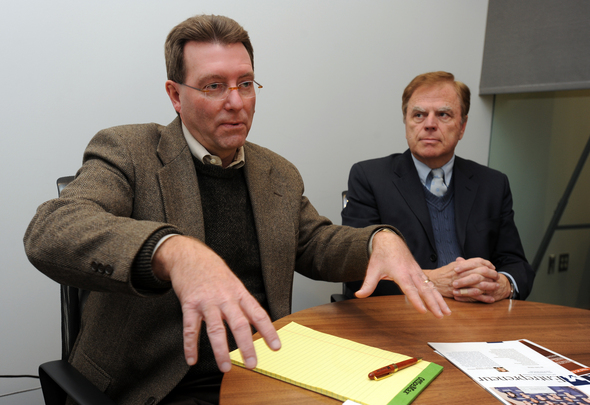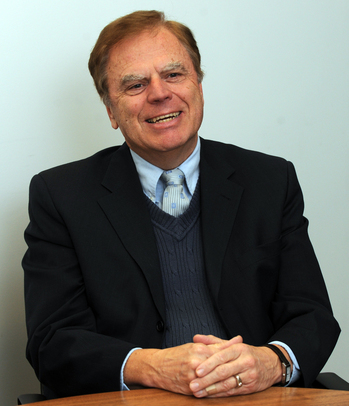Seeking the next Mark Zuckerberg and Facebook-style startup at the University of Michigan

University of Michigan Ross School of Business Zell Lurie Institute for Entrepreneurial Studies managing director Tim Faley (left) and executive director Tom Kinnear, the Eugene Applebaum professor of entrepreneurial studies, say Facebook's rise shows the importance of listening to students' business ideas.
Lon Horwedel | AnnArbor.com
As the University of Michigan’s entrepreneurial movement gains momentum, student-led startup companies are getting national attention.
There are no Zuckerbergs to be found at U-M. Yet.
But with all the attention surrounding Zuckerberg, who started Facebook as a student at Harvard University, the public is starting to recognize that student-led companies can create jobs. Other major companies -- like Cisco Systems, for example -- were launched by students, too.
In December, U-M senior Allen Kim was named College Entrepreneur of the Year by Entrepreneur magazine after co-founding Bebarang.com, a baby clothes rental site.
Kim’s company got its start at U-M's TechArb, an office incubator where student-led businesses are creating jobs and developing legitimate businesses.
If U-M students create the next Facebook, it’s likely that the U-M Ross School of Business’ Zell Lurie Institute for Entrepreneurial Studies will play a role in helping the company get off the ground.
The institute helps student entrepreneurs learn how to run their companies, gives students a chance to invest venture capital funds in real-life companies, and encourages entrepreneurialism through partnerships with other arms of the university. The institute also helped start TechArb along with the College of Engineering’s Center for Entrepreneurship.
Zell Lurie executive director Tom Kinnear and managing director Tim Faley say that landing the next Facebook in Michigan would be nice, but it’s more important to encourage students to learn the principles of entrepreneurship and apply those to their entire career.
AnnArbor.com’s Nathan Bomey recently spoke with Kinnear and Faley. Here are excerpts from that conversation.
AnnArbor.com: Mark Zuckerberg was just named Time magazine’s Person of the Year. He started Facebook when he was a student. What lessons does that have for the Zell Lurie Institute and how you can spur entrepreneurship among students?

Tom Kinnear, executive director of the Zell Lurie Institute and Eugene Applebaum professor of entrepreneurial studies
Lon Horwedel | AnnArbor.com
Tom Kinnear: We have to always be open and encouraging to some things that may seem to be foreign to us.
Most successful entrepreneurs, whether they started in college or not, will tell you the following thing: Most people who looked at their idea turned it down because they didn’t get it. And that’s true of most of the companies I’ve helped found.
Because they were game changers, a lot of people didn’t understand the new game.
We have to be careful that we don’t discourage. I never say to a student, “What a bad idea, what a dumb idea.” We tend to ask questions about how they might form the idea into something that might go somewhere?
AnnArbor.com: So it comes down to encouraging student entrepreneurship regardless of how crazy the idea may seem?
Tim Faley: Students want to pitch ideas by us all the time and see if they’re good ideas or bad ideas. I always tell them, “My job is to help you figure that out. My job is not to tell you that’s a great idea. My job is to give you the skills to figure you out on your own.”
(Facebook) is not the rule. Building a business is hard. It’s hard work. You have to figure out what the opportunity is, you have to figure out if this is financeable. And they go, “Well, I don’t have to do that, I just have to come up with Facebook and become a billionaire and it’s easy.”
AnnArbor.com: Entrepreneurship is hard and it can consume your life.
Kinnear: Right. There’s going to be more losers than winners. What we’re trying to do is get them to think through how they could be a winner in some part of that space.
AnnArbor.com: It does feel like there’s some serious momentum for some of the student-led companies like Bebarang.com, “Netflix for baby clothes.” But, Tim, you talk about the fact that students learning entrepreneurship is more important for the long term and what it means for their careers. What do you mean by that?
Faley: Well, it is a career. Look at (former HandyLab CEO) Jeff Williams, he’s had several companies. (Accio Energy CEO) Jennifer Baird now is on her second company.
That’s how you create a foundation of jobs. It’s skilled entrepreneurs that build strong businesses. We know from our surveys, we know from other research that really serious entrepreneurs are going to start many companies in their lives.
Kinnear: But more typically - and those are perfect examples - 10 years after they’re out (of college).
The Zuckerbergs of the world are the exceptions. More common, for example: The founders of (coupon deals website) Groupon are Michigan graduates. But they’re a decade-plus out before they did it.

Tim Faley, managing director of the Zell Lurie Institute for Entrepreneurial Studies
Lon Horwedel | AnnArbor.com
Faley: If I only coach you through the formation of that one business, I’ve done you a great disservice, because the odds of that business making your 30-year career are about zero.” So we use the development of that business as a learning platform.
(Bebarang) is great, I hope that company turns out great. But we’ve taught them along the way how to start businesses, plural. So if that one doesn’t go, or even if it goes and they sell it, they’re going to do something else, and that’s what we want to teach them to do.
Kinnear: (U-M microcontroller startup) Ambiq (Micro) is a good example because that’s a combination of engineering and business students. Its original presentation, if we showed it to you, you wouldn’t think they’d get a dime.
But by the time they went through the whole process of being coached here and went through the gauntlet of presentations to outside evaluators, they became quite a different thing. We salute them, they learned and they did great. I wouldn’t be surprised if they end up starting multiple other companies at some point.
AnnArbor.com: But Ambiq is moving to Austin, Texas.
Kinnear: Ambiq happens to be in an area where it’s really hard to grow the business in Michigan because it’s semiconductors.
Faley: The people (they need) all live there.
Kinnear: Medical devices, biomed, clean tech, anything military, IT - Michigan’s a great place.
Faley: Some businesses are clustering in certain geographic areas, so if the employee pool they want to pull from is in that area, they’re going to move.
Kinnear: At one time they said you couldn’t do medical tech startups here, but now there’s a whole bunch of them, because they got a core of them going and you’ve got some money here that can help them.
AnnArbor.com: Rick Snyder has talked a lot about building an entrepreneurial economy, but there are a lot of barriers to that with the culture. From where you sit as leaders in trying to generate that on a grassroots basis, how do we overcome those cultural barriers?
Faley: The Big Three have helped us enormously. I was in a meeting with representatives of the Big Three and (a colleague) said, “I want to thank you all for making our jobs of convincing students to start companies so much easier.” Because the tradeoff was enormous. “OK, I’m going to have a secure 30-year job at GM or Ford or Chrysler or I’m going to do this risky startup.”
But now, they’re both equally risky. I can go work for Ford and maybe in five years I have a job or maybe I don’t. Or I can do the startup, and maybe I have a job in five years and maybe I don’t because the company tanks.
But at the end of the five years of the startup, look at what I’ve done with my skillset. I know so much more. Therefore I’m so much more marketable than if I spend five years in this little cubicle at this big company.
That doesn’t look nearly as risky. It almost looks more attractive than this big job did. That’s part of what will switch the mindset.
Kinnear: There’s four legs of this chair. There’s ideas, there’s money, there’s people, and culture. And the hardest is culture, because it takes time.
Michigan was the entrepreneurial capital of the planet a hundred years ago. And then a whole bunch of people got rich, they liked being rich, they forgot how you got rich and their children forgot how you get rich.
But culturally, I think we could all agree, if this 2-by-4 hasn’t hit Michigan over the head hard enough at this point, then some people are never going to get it that we have to take it into our own hands and start forming our own companies.
Part of the problem is the infrastructure is not all there anymore. So we’re starting to rebuild a venture capital infrastructure and an angel (investing) infrastructure.
Rick knows what it means to be an entrepreneur, he knows what it means to finance entrepreneurs. He’s been very successful at that.
But in fairness, Jennifer Granholm tried really hard through initiatives that were supported very broadly - bipartisan initiatives. But she was up against a nut that’s not solved in eight years.
She had other themes, and she was also wedded to her constituencies, too. But we have a governor right now who’s sort of divorced of any constituency, because he came in independently. And one would expect that he will proselytize big time for this issue.
Faley: The jobs going forward are going to be knowledge jobs. They’re not algorithmic, labor jobs that are repetitive.
Those jobs are all getting outsourced to the low-cost producer, and they’re not going to be here.
Contact AnnArbor.com's Nathan Bomey at (734) 623-2587 or nathanbomey@annarbor.com. You can also follow him on Twitter or subscribe to AnnArbor.com's newsletters.


Comments
Trepang674
Fri, Jan 7, 2011 : 10:30 a.m.
In the advent of Goldman Sachs buying up Facebook...apparently undervalued on the market...someone is going to have to make a profit in that deal. What do you think GS is going to do with all that personal information? GS is such a profit driven at all cost company..we are really vulnerable. We need an alternative badly.
UtrespassM
Wed, Jan 5, 2011 : 8:13 p.m.
There will not be any Zuckerberg and Facebook-style startup at the University of Michigan. Why? the school culture.
runbum03
Sun, Jan 2, 2011 : 3:59 p.m.
Where's our Facebook investor and PayPal founder Peter Thiel? Yes, the same dude who started the Thiel Fellowship to pay young entrepreneurs $100,000 to drop out of college and start their own businesses? However, if one wants to do well in Michigan, then stay in school and get a government job (hiring is exploding) or a government grant (state money is flowing like a fire hose). What "greats" has the U of M produced lately? - Regulators - Bean counters - Legal beagles If you want to learn regulations, how to count beans or make new laws, the U of M is there for you. For the others, those not afraid to stand on their own two feet, see Mr. Thiel.
nickcarraweigh
Sun, Jan 2, 2011 : 10:30 a.m.
This idea is preposterous on its face. What is required for business start-ups is capital, timing, luck and an idea. Anything else, from polysyllabic words to four-year degrees, is window dressing. The most financially successful people in this story are mentioned only indirectly: Stephen M. Ross and Zell Lurie (whoever he or she is or may have been). They both seem to have enriched themselves enough to afford to pay U-M to name something in their honor. Those who can, do. Interestingly, while the story gives the rise of the auto industry the ritual due that has become the norm when speaking of business start-ups in Michigan, left unmentioned is the 900 pound elephant in the room -- Michigan is on the navigable Great Lakes and about halfway between the coal fields of Pennsylvania and the iron ore mines of Minnesota, but the tipping point for the car business was the availability of capital. Michigan produced more natural resource-based wealth between 1850 and 1900 than any other state, including California, Nevada, and Alaska with their gold and silver rushes. Thank the great Chicago Fire and the timber business.
Soothslayer
Sun, Jan 2, 2011 : 9:27 a.m.
"Wheres our Mark Zuckerberg?" is a misleading statement. He wanted to build an electronic way to dis on popular & attractive kids. Pandering commercialism is not a very useful or noble a cause. We have established innovation talent available that are able to produce output that has much more value and far reaching implications. The local VC's simply aren't interested in them.